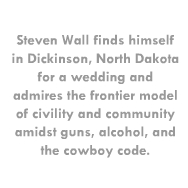

Though in possession of strong cowboy credentials myself, the thought of spending a weekend in cowboy country for a wedding was a bit distressing. Ambivalent about my red-neck roots in the American West and having developed a taste for many of the finer things in life - hard lemonades, air conditioning in cars, paved roads - I was not thrilled to make a travel destination of a college town majoring in rodeo and Wal-Mart moments.
Wouldn't you know it: it was stampede weekend and the red-neck cowboys were all staying in my hotel. Hmmmm.
After learning to drink Budweiser with some of the guys and relearning how to shoot pool, I began to revisit a lot of the positive aspects of the cowboy society I had left behind. Though lacking mochas and outdoor cafés, I wondered if, after all, they might not perhaps be better off in many ways than I.
The term "redneck" is often applied to any number of supposedly simpler societies - including that of the cowboy - encountered by more sophisticated urban folk, but it would seemingly have its origin with the observable sunburn borne by people who have spent too much time working outdoors. Where does an unemployed bureaucrat like me get off thinking I'm any better off than one who makes an honest living and has honest fun in the elements? In fact, I found myself suspiciously jealous of their lifestyle. If their life was harder, so were their bodies and seemingly, their fun.
But it is the code of these cowboys that I want to address. Growing up in Montana, I was very much aware of the "Cowboy Way," an ethical lifestyle passed on to us by our immediate forebearers and codified by the likes of Zane Gray and Louis L'Amour, the two great apostles of the Northern Great Plains. Basic to this code are principles such as: always respect others, give each day its full measure of work, water your horse before yourself, honor your mother, listen to the preacher, and never shirk from a challenge for a lack of courage or tryin'. Also important are: hear good advice, uphold your friends, always aid someone in need, and studiously seek to understand the environment around you. Perhaps it is best summed up with L'Amour's code of the Sacketts, a family of characters that recurs in many of his novels: "Always leave the trail better than you found it." Far from being outcasts from the greater society of today or being stuck in a heyday mentality in the past, cowboys may indeed personify many of the traits that made America great and whose loss may have led to the present era of the rat race and despair.
Primary to the cowboy ethic is a sense of community. Historically, there were so few cowboys that you were glad for another's company, if not in need of his or her aid. They depended on each other to drive herds, survive storms, and get the job done. It was a true community where all received a modicum of respect and often aimed to achieve more, and all had to strive to do their part or the whole might fail with disastrous results. Backstabbing and profiteering were a sure way to get separated from the group, a group upon which your survival in the harsh northern prairies might eventually depend.
I hate to agree with Charlton Heston, but guns have long been an integral tool of the cowboy, and with those guns came an understanding of respect. You had to respect others. To fail in this regard could - and as I am assured often did - end with your own untimely demise. Guns taught you that you and your job were important enough to defend in the face of danger from predators or others. And guns taught you respect for your actions. When you shoot a gun, you cause a reaction, often one that cannot be undone. You need to be sure of your purpose, sure of your skill, and able to accept the consequences of your shot. At an early age we were taught to respect the gun as a tool and weapon and to be aware of where (and at what) even an empty gun was aimed.
As for alcohol...well, the boys at the stampede helped me understand its place in the code, too. It is important to have fun and feel free to pursue enjoyment. After an honest, hard day, you've earned the right to unwind, let loose, and enjoy a drink or two; but be responsible and look out for each other while doing so. The boys at the stampede freely imbibed, but it was good to see that they tended to do so in groups of three or more and that usually one of the more sober-minded kept an eye on his companions. I also noted that a lot of the more destructive behavior and excessive drinking came from solitary figures lacking the watchful gaze and companionable restraint of the guys hanging out in groups. Companionship can apparently be a powerful mitigator of destructive tendencies and perhaps a facilitator of enjoyment.
Something more important than having fun also occurred while the fellows were sharing their beer. They were instructing each other, passing on information and tips, and retelling stories learned from other cowboys and older brothers who had come before, gleaning wisdom from experience and folklore.
Now, I am not asserting that beer or guns are the necessary tools to establish moral behavior and thus save our society, but rather that their place in cowboy society and the code that they anchor might be worth a second look. Maybe in our enlightened rush to protect us from ourselves and rid our lives of fear, danger, and hard work, we have lost something: respect for others (and our own actions) and the small enjoyments around which we gather to share our companionship, our fun and experienced wisdom. Perhaps until we form new symbols to anchor a newer, more refined code, we should pay a little more respect to the ones around us that are still in place doing their jobs.